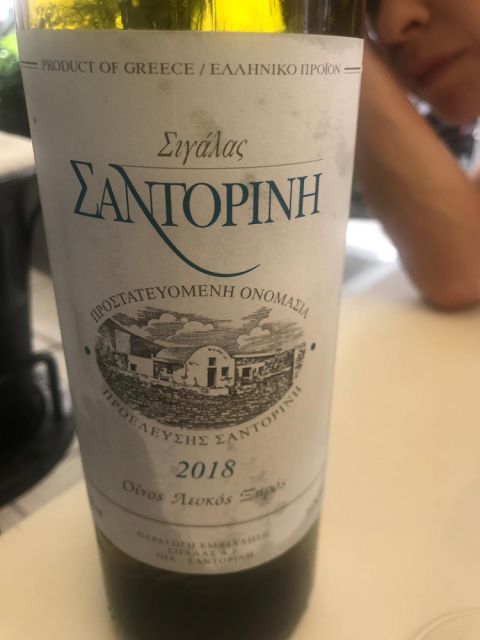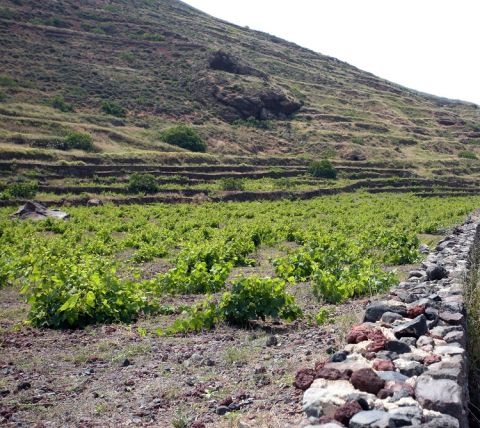From €19.90 (on offer), 95 Romanian lei, CA$32, $28, 3,110 yen, HK$240, £29.95, 33.25 Swiss francs, AU$52, 1,170 Taiwan dollars, SG$59
On a blazing hot day in late August in Athens, we found ourselves at a fish restaurant in the Plaka, the walls of the atrium of Hadrian’s library rising up on one side of us, the Acropolis high on another. We wanted shade – desperately – and something cool to eat and drink. BlueFish promised tables under a thick canopy of mulberry and jacaranda trees and, according to friends the night before, a sea bream carpaccio ‘to die for’.
They were right. This Greek–Japanese fusion restaurant really did provide stunning seafood. But they brought us the wrong wine.
We ordered the Hatzidakis Assyrtiko. They brought out a bottle and showed the label to me. I nodded and said yes, but beyond working out that ΣANTOPINH might be Santorini, everything else looked very Greek and I couldn’t see the word Hatzidakis anywhere. But I was too bamboozled by Greek script and Athenian heat to know what I was saying yes to. So I said yes and the bottle was duly opened.
It was perfect. Delicious. Spine-tingling. But I still couldn’t see Hatzidakis on the label. As soon as the waitress headed back into the restaurant, I pulled the bottle out the ice bucket and examined it forensically. There, in tiny letters at the very bottom of the back label, in (thank heavens) Latin alphabet, was a website: www.sigalas-wine.com.
Paris Sigalas was born in Piraeus, the port town of Athens. He studied mathematics, and then spent four years in Paris, France, doing a post-graduate degree and it was here that fine wine made an imprint on his life. He came back from France and moved to Santorini in the 1980s, teaching at the local high school.
It was during this time that he began to make wine, as a hobby at first, in the small family winery his grandfather had owned near Finikia. Eventually, in 1991, wine took over and Paris Sigalas left teaching. By 1998 Domaine Sigalas had grown out of the family kanava (traditional cave/wine cellar) and a much bigger, modern winery had been built.
It was his passionate belief that indigenous Santorini varieties, Assyrtiko in particular, had the potential to be great wines. His faith has been borne out. For much more on Sigalas and his winery as well as tasting notes on all his wines, see Julia's recent article, Santorini tasting notes part 2.
This particular wine – one of nine varietal Assyrtiko bottlings from this address – has no oak. Just stainless steel, controlled-temperature fermentation using selected yeasts and a bit of lees contact. The vines are over 60 years old although only 40% of the grapes come from their own vineyards, the rest from producers around the island.
It’s not a wine you can capture in fruit and flowers, although it does deliver a haze of grapefruit-peel powder and perfume, and there is a kind of citrus purity on the palate. It has nerve but is not nervous. It is tingling but not spritzy. It is bone dry but floods your mouth with saliva. It has breadth and power but doesn’t dominate the table. And despite 14% alcohol, it is graceful and balanced.
It seemed to echo the structure of the huge, ancient stone walls beside us as well as the cool leafy shade we sat under.
On the last night of our trip, we tried it again – this time knowing what we were ordering. It went beautifully with the simple but beautifully grilled sole and wild prawns we were eating, as well as the tuna tartare and fried zucchini with yogurt sauce we’d ordered to start.
I tasted the 2018, but if you look in our tasting notes database, you’ll see that this wine scores consistently well (in fact, Jancis made the 2009 her wine of the week in 2010) and, if Julia's recent note on the 2003 is anything to go by, it ages beautifully (our drink dates may well be a little conservative). So I haven't specified a vintage in the Wine-Searcher link. You won’t go wrong buying an older vintage.
The 2018 is available in the UK from The Whisky Exchange for £29.95 and you can get older vintages at other UK merchants for slightly more than that. You can buy the 2018 direct from the Sigalas winery for €24, although GreeceandGrapes.com is selling it at a reduced price of €19.90 at the moment. It’s also available in Germany, Italy, the Netherlands, Belgium, Switzerland, Austria, Luxembourg, Romania, Cyprus, the USA (from $27), Canada, Australia, Hong Kong, Japan and Taiwan.
This is not a bargain-basement wine. But it’s worth what you pay for it.

















